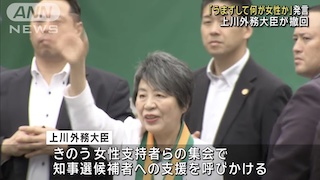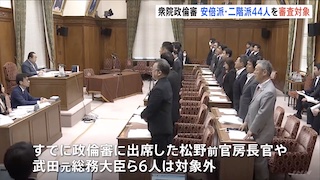TOKYO, Oct 25 (East Asia Forum) - On 24 August 2023, immediately after Japanese authorities released treated wastewater from the Fukushima nuclear plant into the Pacific Ocean, China suspended all seafood imports from Japan.
While the public’s concerns over contamination might justify the decision, China’s track record of employing plausible deniability, coupled with Japan’s compliance with international safety standards and China’s similar nuclear waste management practices, raise questions about China’s motivations.
International Atomic Energy Agency officials check marine products collected for inspection in Iwaki City, Fukushima Prefecture on 19 October 2023 (Photo: Kentaro Tominaga/The Yomiuri Shimbun via Reuters).
The restriction was issued by the General Administration of Customs and followed a protracted disinformation campaign aimed at stoking public fears, suggesting that political motivations lie behind the decision. The episode offered a pretext for Beijing to punish Tokyo’s push to increase security cooperation with Seoul and Washington.
It also allowed China to send signals to both domestic and international audiences. Domestically, Beijing stoked anti-Japanese sentiments to divert attention from a troubled economy. Internationally, China echoed concerns aired by Pacific Island nations to reiterate its image as champion of the ‘Global South’.
China has become adept at using trade as a tool of statecraft. Japan suffered export bans for critical minerals in 2010 amid heightened territorial tensions in the East China Sea. In 2017, Beijing embargoed South Korean goods and services after Seoul deployed US anti-missile batteries. China also imposed informal sanctions over a range of Australian products following Canberra’s call for an independent inquiry into the origins of COVID-19. China leverages its huge market and dominance over critical supply chains to punish unwanted behaviour.
China justified the seafood ban by invoking the World Trade Organization’s rules on phytosanitary measures. Yet reports in China exposed a government-coordinated disinformation campaign on the issue. State-owned media discredited scientific advice endorsing the release of nuclear wastewaters with paid social media campaigns and misleading reporting. Japanese schools, businesses and diplomatic missions in China were harassed. The ban being issued by the General Administration of Customs suggests that the order came from the top down, rather than being the result of lower-level technical bodies’ decisions snowballing into a national policy.
But if Beijing’s intention was to alter Tokyo’s behaviour, seafood is not an effective economic stick, since it makes up only a marginal component of bilateral trade. The ban mainly risks affecting Chinese companies, as consumers have already stopped buying seafood altogether.
The ban is largely symbolic, and the rationale may be twofold. The week prior to the ban, leaders from Japan, South Korea and the United States gathered in Washington to elevate trilateral cooperation. The parties agreed to deepen trilateral defence cooperation, endeavour to tackle instability in the Taiwan Strait and the broader Indo-Pacific and condemned China’s conduct in the South China Sea. Unsurprisingly, the summit prompted China’s condemnation but excluded explicit countermeasures. The Fukushima case provided Beijing with an opportunity to chastise Tokyo while maintaining plausible deniability about its political intentions and not stirring up further tensions.
Beijing may have another reason for banning Japanese seafood — virtue signalling. At home, China is grappling with unprecedented youth unemployment, a stumbling property sector and decreasing growth rates. Appeals to endure hardship can only do so much to mobilise support from a disillusioned population. Stirring nationalistic sentiments against the old enemy Japan through disinformation and the trade ban provided the Chinese government with a useful decoy to temporarily distract the domestic audience from economic troubles.
Internationally, the ban is aimed at signalling support for the South Pacific’s concerns. China’s concerns over the discharge of the Fukushima waters echo Pacific Island nations’ reservations, as they more strongly perceive the dangers of contamination. Solomon Islands Prime Minister Manasseh Sogavare strongly condemned Japan’s actions and protests took place in Fiji. Beijing acted as the bellwether of the South Pacific nations, throwing weight behind their claims to curry favour with states in the increasingly contested region.
As the US–China rivalry intensifies, adversaries will use every opportunity to accuse the other of playing geopolitics. The strengthening of the US–Japan–South Korea trilateral cooperation is only one recent example of US President Joe Biden’s goal of strengthening the ‘latticework’ of alliances to shape China’s behaviour. As the United States doubles down on its allies, Beijing has looked to intensify its outreach to the Global South, labelling Washington’s alliances forms of containment.
China’s move is a signal against the United States and its allies — most of whom supported the waters’ discharge — that Beijing has no qualms about questioning scientific evidence to accuse them of misconduct. It also sends a message to the whole region that, should tensions intensify, China will not hesitate to dial up the pressure. The Fukushima case shows that trade and economic linkages will be exploited as tools of statecraft more and more frequently.
Walter Brenno Colnaghi is a Research Assistant at the ANU National Security College. He completed a Master of Science at the London School of Economics (LSE) and has experience working for the Italian Foreign Ministry and the European External Action Service in the Indo–Pacific.













